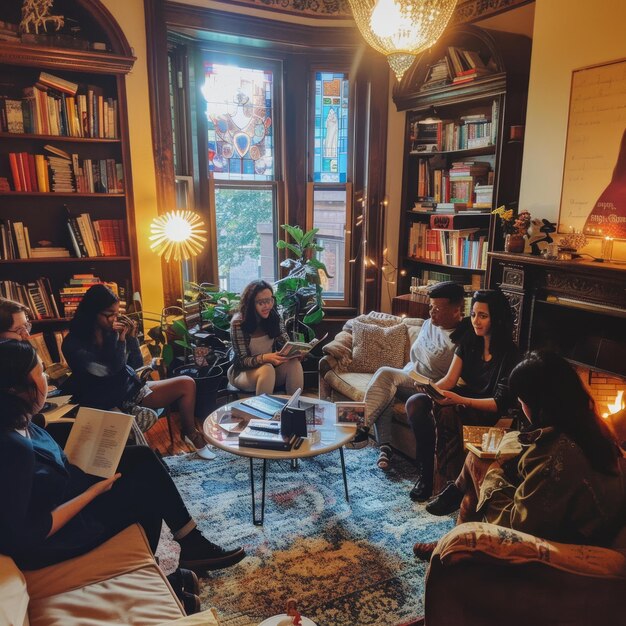Decoding Classics: Fresh Literature for Your 2025 Book Club

Decoding the Classics: A Fresh Perspective on Timeless Literature for Your 2025 Book Club
offers contemporary readers and book clubs innovative ways to engage with canonical works, ensuring their enduring relevance and sparking richer discussions beyond traditional interpretations.
Tired of the same old book club discussions? Seeking to rekindle your passion for literature
beyond contemporary bestsellers? This article will guide you through a transformative journey of
Decoding the Classics: A Fresh Perspective on Timeless Literature for Your 2025 Book Club,
exploring how these enduring works still resonate, provoke, and inspire in our modern world.
Beyond the Textbook: Why Classics Still Matter
For many, the term “classic literature” conjures images of dusty tomes and required reading lists
from school. Yet, these works earned their enduring status for profound reasons—they capture the
essence of human experience, explore universal themes, and often challenge societal norms long
before such discussions became mainstream. Ignoring them is to miss out on a rich tapestry of
thought that informs much of what we read and experience today.
Revisiting classics with a fresh perspective allows us to uncover layers of meaning that might have
been overlooked in earlier readings or traditional academic settings. It’s about finding personal
relevance in narratives written centuries ago, recognizing the echoes of our own lives and society
within their pages. This journey is not about rote memorization or dry analysis, but about engaging
with stories that continue to shape our understanding of the world.
The Enduring Power of Universal Themes
Classics often tackle themes that are timeless and borderless. Love, loss, ambition, betrayal,
justice versus injustice, the search for identity—these are not confined to specific eras but are
intrinsic to the human condition.
-
Exploration of Human Nature: From the moral dilemmas in Dostoevsky to the
social intricacies of Austen, classics offer unparalleled insights into personality and societal
dynamics. -
Historical and Cultural Anchors: Reading classics provides a window into past
eras, helping us understand the roots of contemporary culture and politics, grounding our present
in a deeper historical context. -
Linguistic and Narrative Mastery: Many classics are celebrated for their prose,
their innovative storytelling techniques, and their profound impact on literary tradition.
Engaging with them can refine one’s appreciation for language itself.
Ultimately, classic literature serves as a continuous dialogue across generations. It invites us to
participate in conversations that have been ongoing for hundreds of years, offering solace,
challenge, and profound understanding. Approaching these texts with an open mind, seeking out their
resonances with our current lives, transforms them from academic exercises into vibrant, living
dialogues.
Curating Your 2025 Book Club List: Beyond the Obvious Choices
Building a classic-focused book club list for 2025 requires thoughtful curation. While works like
“Pride and Prejudice” and “The Great Gatsby” are undeniable cornerstones, there’s a vast universe
of less frequently discussed classics that offer equally rich, if not more surprising, insights.
The goal is to select texts that spark lively debate and reveal new dimensions upon re-reading,
rather than simply confirming preconceived notions.
Consider works from diverse global traditions, or those by authors often marginalized in traditional
canons. This expands your book club’s horizons and introduces members to different narrative styles
and cultural perspectives. The “classic” designation should not restrict your choices; rather, it
should guide you towards works of enduring artistic and intellectual merit.
Discovering Hidden Gems and Global Classics
Moving beyond the typical European and American mainstays can be incredibly rewarding. Broadening
the scope can introduce members to different forms of storytelling and philosophical tenets.
-
“Things Fall Apart” by Chinua Achebe: A powerful critique of colonialism
through the lens of Igbo society in Nigeria, offering a vital African perspective. -
“One Hundred Years of Solitude” by Gabriel García Márquez: A masterpiece of
magical realism that traces the multi-generational story of the Buendía family in Macondo. -
“The Tale of Genji” by Murasaki Shikibu: Often considered the world’s first
novel, this 11th-century Japanese work provides an intricate portrayal of aristocratic life.
When making your selections, think about the themes that resonate most with your group right now.
Are you interested in social justice, personal freedom, the impact of technology, or the complexities
of human relationships? There’s a classic that speaks to almost any contemporary issue, often with
nuance and depth that modern works struggle to achieve. Prioritize accessibility and quality
translations if engaging with non-English language originals.
The Power of Reinterpretation: New Lenses for Old Stories
The beauty of classic literature lies in its enduring capacity for reinterpretation. What a work
meant to readers in the 19th century may differ significantly from its resonance with a 21st-century
audience. Our contemporary understanding of psychology, sociology, gender, and post-colonial studies
can unlock entirely new layers of meaning within these texts. This isn’t about imposing modern views
onto the past, but rather using our accumulated knowledge to engage in a richer, more critical
dialogue with the text.
Encourage book club members to approach classics not just as historical artifacts, but as living
documents that can absorb and reflect current perspectives. This involves asking new questions,
challenging conventional interpretations, and being open to the idea that a text’s meaning is fluid
and evolves with its readers.
Applying Modern Critical Approaches
Modern critical theories offer powerful tools for dissecting classic texts and revealing their
hidden dynamics. These approaches move beyond plot summary to explore deeper societal and
individual implications.
-
Feminist Readings: How do characters like Edna Pontellier (“The Awakening”) or
Jane Eyre navigate patriarchal societies? What are the limitations and rebellions of female
characters? -
Post-Colonial Perspectives: Examining works like “Heart of Darkness” or even
Shakespearian plays through a post-colonial lens reveals underlying power structures and biases
of the colonial era. -
Psychological Analysis: Characters such as Hamlet or Raskolnikov (“Crime and
Punishment”) become fascinating subjects for exploring human motivation, guilt, and the depths of
the psyche.
This approach encourages skepticism towards established academic interpretations and empowers book
club members to develop their own informed readings. By actively seeking out contemporary connections
and applying diverse analytical frameworks, your book club transforms classic texts from static relics
into dynamic platforms for intellectual exploration and lively debate.

Facilitating Engaging Discussions: Guiding Your Book Club
The success of a book club, especially one diving into classics, hinges on effective facilitation.
It’s not enough to simply read a book; the true value emerges from the shared exploration and diverse
perspectives brought to the discussion. A good facilitator encourages participation from all members,
keeps the conversation on track, and introduces thought-provoking questions that delve beyond the
surface. This is particularly important with classics, where readers might feel intimidated by the
text or by pre-existing critical analyses.
The goal is to create an open and inclusive environment where every member feels comfortable sharing
their interpretations, however unconventional they may seem. This can involve setting ground rules for
respectful debate and providing resources that help demystify the text without dictating its meaning.
Crafting Compelling Discussion Questions
Moving beyond “Did you like the book?” requires questions that probe deeper into themes, character
motivations, and stylistic choices.
-
Thematic Links: “How do the themes of identity and societal pressure in ‘The Catcher
in the Rye’ resonate with contemporary teenage experiences?” -
Character Analysis: “Given the historical context, was Elizabeth Bennet’s refusal
of Mr. Collins an act of defiance or pragmatism in ‘Pride and Prejudice’?” -
Literary Devices: “How does Hemingway’s sparse prose in ‘The Old Man and the Sea’
contribute to the overall feeling of isolation?”
Consider providing preparatory materials, such as short biographical sketches of the author,
historical context notes, or even a brief overview of relevant literary criticism. These resources can
equip members with a foundation to explore the text more deeply, fostering more informed and robust
discussions. Encourage members to identify passages that particularly resonated with them or provoked a
strong reaction, using these as jumping-off points for dialogue.
Connecting Past to Present: The Relevance of Classics Today
Perhaps the most compelling reason to read classics in 2025 is their uncanny ability to mirror and
illuminate contemporary issues. While the settings and social norms may be vastly different, the
underlying human struggles and societal dynamics often remain strikingly similar. Whether it’s class
struggle, political corruption, the pursuit of happiness, or the complexities of love and family,
classics offer historical precedents and nuanced perspectives that can enrich our understanding of
the modern world.
By drawing explicit connections between the themes of a classic work and current events or societal
trends, book club discussions can become incredibly pertinent and engaging. This transforms the act of
reading from a passive historical exercise into an active engagement with enduring human concerns.
Timeless Themes and Modern Echoes
Many classic narratives provide frameworks for understanding repetitive patterns in human behavior and
societal development. They offer a looking glass through which we can observe ourselves.
-
Social Justice and Inequality: Works like “Les Misérables” or “Uncle Tom’s Cabin”
offer stark portrayals of poverty, class disparity, and systemic oppression that resonate with ongoing
discussions about social justice. -
Technology and Humanity: Although written before the digital age, literature like
“Frankenstein” explores the ethical implications of scientific advancement and human hubris, themes
more relevant than ever in an AI-driven world. -
Power and Corruption: From Shakespeare’s tragedies to Orwell’s “1984,” classics
chronicle the corrupting influence of power and totalitarianism, providing cautionary tales for
contemporary politics.
Encourage book club members to bring examples from their own lives or from current news headlines that
relate to the themes encountered in your chosen classic. This personalizes the discussion and
demonstrates the living, breathing relevance of these seemingly old stories, solidifying why
Decoding the Classics: A Fresh Perspective on Timeless Literature for Your 2025 Book Club
is such a valuable endeavor.
Overcoming Obstacles: Making Classics Accessible and Enjoyable
For many, the perceived hurdles to enjoying classic literature can be significant. Archaic language,
unfamiliar social customs, and lengthy descriptions often deter modern readers accustomed to faster-paced
narratives. However, these obstacles are surmountable with the right approach and resources. The key is
to demystify the text, provide necessary context, and emphasize the rewards of persevering through initial
difficulties.
Your book club can collectively tackle these challenges, transforming potential points of frustration
into opportunities for shared learning and deeper appreciation. This collaborative effort helps lighten
the load and builds confidence in engaging with more complex literary works.
Strategies for Engagement and Comprehension
Making classics enjoyable involves more than just reading; it includes active strategies to enhance
understanding and engagement.
-
Use Annotated Editions: Many classics are available with helpful footnotes and
introductions that explain historical context, difficult vocabulary, and literary references. -
Listen to Audiobooks: Professional narrations can bring older texts to life,
improving comprehension and making the prose more accessible, especially for challenging language. -
Consult Online Resources: Websites like SparkNotes, LitCharts, or Project Gutenberg
offer summaries, character analyses, and historical background that can supplement reading.
Emphasize that it’s okay not to understand every single word or reference on the first pass. The goal
is to grasp the broader narrative and themes. Encourage members to highlight confusing passages for
discussion, as collective interpretation can often clarify ambiguities. By actively addressing potential
difficulties, your book club transforms the reading of classics from a daunting task into a rewarding
intellectual adventure.

Beyond the Book: Enhancing the Classic Experience
A classic book club experience extends beyond simply reading and discussing the text. To truly immerse
yourselves in the world of the book and its author, consider incorporating supplementary activities that
add layers of context, entertainment, and deeper appreciation. These can range from exploring film
adaptations to delving into the historical periods that shaped the literature. Such multi-faceted
engagement enriches the reading journey and provides new avenues for understanding the timeless appeal of
these works.
These supplementary activities elevate the book club from a mere discussion group into a comprehensive
cultural exploration. They foster a holistic understanding of the classic, its creator, and its place in
the broader scheme of human history and artistic expression.
Creative Approaches to Classics
Bringing the classics to life can involve a variety of creative and interactive activities that resonate
beyond the pages.
-
Film Adaptations and Comparisons:
Watch a classic film adaptation (or multiple versions) of the book. Discuss how the translation to
screen impacts characters, plot, and themes. For example, comparing different “Pride and Prejudice”
adaptations can highlight key interpretive choices. -
Historical Context Immersion:
Research and present on the historical period or major events influencing the book. This might involve
exploring the French Revolution for “A Tale of Two Cities” or Victorian social norms for “Jane Eyre.” -
Author Spotlight:
Dedicate part of a meeting to a deeper dive into the author’s life, other works, and their unique
contributions to literature. Understanding the author’s context can illuminate their intentions and
perspectives. -
Themed Culinary and Attire:
Host a book club meeting with food or drinks inspired by the book’s setting, or invite members to
dress in the style of the era. This adds a fun, sensory dimension to the experience. -
Literary Walks or Virtual Tours:
If possible, visit locations that inspired the book or were significant to the author. If not,
explore virtual tours of relevant museums or historical sites online.
By integrating these diverse activities, your book club transforms into a vibrant hub for cultural and
intellectual exchange. It deepens members’ connection to the classics, reinforcing that
Decoding the Classics: A Fresh Perspective on Timeless Literature for Your 2025 Book Club
is not just about reading, but about living the literature. This holistic approach ensures that each classic
becomes a memorable and enriching experience for everyone involved.
| Key Aspect | Brief Description |
|---|---|
| 📚 Curating Choices | Select diverse, thought-provoking classics beyond the usual suspects to ignite fresh discussions. |
| 💡 Reinterpretation | Apply modern critical lenses (feminist, post-colonial) to uncover new meanings in timeless narratives. |
| 🗣️ Engaging Discussions | Use targeted questions and resources to foster deep, participant-driven analysis of themes and characters. |
| 🔗 Modern Relevance | Connect classic themes to current events, demonstrating their enduring power to illuminate today’s world. |
Frequently Asked Questions About Decoding Classics
▼
Reading classics can broaden perspectives and deepen understanding of universal human experiences
and historical contexts. These enduring works offer profound insights into timeless themes,
providing a rich intellectual foundation for compelling discussions. They also challenge readers to
engage with diverse literary styles.
▼
Look beyond the most obvious titles to include diverse global classics and works by underrepresented
authors. Consider what themes resonate with your group, like social justice or identity. Prioritize
accessible translations and discuss potential challenges the text might present beforehand.
▼
Try using annotated editions with footnotes, listening to audiobooks for challenging prose, or
consulting online resources like SparkNotes for summaries and context. Encourage members to highlight
difficult sections for group discussion, making the process a shared learning experience.
▼
Focus on open-ended questions that explore themes and character motivations rather than just plot.
Connect the classic’s themes to contemporary issues or personal experiences. Encourage diverse
interpretations and provide relevant background information, like historical context or author insights.
▼
Absolutely. Classics often tackle universal themes such as power, love, injustice, and human nature
that remain deeply relevant today. By applying modern critical perspectives and drawing explicit
connections to current events, these timeless works offer profound insights into contemporary society.
Conclusion: The Timeless Journey of Discovery
The journey of Decoding the Classics: A Fresh Perspective on Timeless Literature for Your
2025 Book Club is far more than an academic exercise; it’s an invitation to a continuous
dialogue with some of humanity’s most profound thinkers and storytellers. By approaching these
works with openness, curiosity, and a willingness to explore new interpretations, your book club
can transform what might seem like daunting historical texts into vibrant, relevant conversations.
Embrace the challenge, lean into the rich layers of meaning, and allow these timeless narratives to
illuminate, provoke, and connect you to the broader human experience in ways few contemporary works
can. The classics await, ready to reveal new dimensions in 2025 and beyond.





